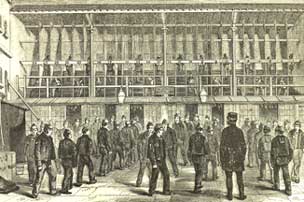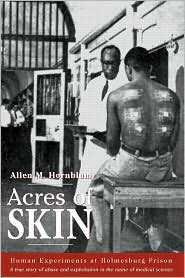Related Topics
Outlaws: Crime in Philadelphia
Even the criminals, the courts and the prisons of this town have a Philadelphia distinctiveness. The underworld has its own version of history.
Franklin Inn Club
Hidden in a back alley near the theaters, this little club is the center of the City's literary circle. It enjoys outstanding food in surroundings which suggest Samuel Johnson's club in London.
Medical Malpractice
The medical system is on the point of abandoning the city to escape abusive lawsuits. A series of observations about shared blame, ultimately assigns responsibility to the mistake of allowing this matter to be covered by insurance, thus creating a financial target.
Philadelphia Medicine
The first hospital, the first medical school, the first medical society, and abundant Civil War casualties, all combined to establish the most important medical center in the country. It's still the second largest industry in the city.
Customs, Culture and Traditions
Abundant seafood made it easy to settle here. Agriculture takes longer.
Durance Vile

|
| Castle of Ferdinand and Isabella |
Visitors to the royal castle of Ferdinand and Isabella are routinely shown the iron grating beneath the throne, below which is a small dark hole for a couple of prisoners. By contrast, most American cities have prisons containing thousands of prisoners. At the time of the discovery of America, dungeons were places to hold a few important prisoners waiting for execution or ransom. What happened to other criminals is left to the imagination, and ranged from public flogging to public execution, often preceded by torture. Torture was not primarily a method for extracting espionage from a spy, it was a form of punishment, quite explicitly designed to horrify and intimidate others who needed the warning to prevent crime. Imprisonment was too expensive to be justified in the case of ordinary crime; in the Eighteenth Century, it was common to hang people for stealing a loaf of bread. Hanging alone might not be sufficiently awesome; the hanged criminal was often torn apart and the pieces of meat dragged through the streets by horses. In extreme cases, hanging was dispensed with and it was sufficient to draw and quarter the miscreant.

|
| Victorian Era Prison |
Without further unnecessary detail, the point must be made that imprisonment was originally devised as a humane improvement, an enlighted advance. It is nevertheless entirely true that prison conditions in every jurisdiction in every country -- are unspeakably bad. While it is probably true that public officials commonly take the view that if we must have these prisons, it is of some deterrent value to spread rumors that they are worse than they actually are. The central truth is that prisons are more expensive than most people want to spend on deterrence and punishment; so they are characteristically underfunded, and most evils grow out of the pinch-penny management which the taxpayers force on the wardens. Bleak, dank and dirty, usually a century or more old, with disgusting food, cramped quarters, and a pervasive atmosphere of suppressed violence, sometimes inadequately suppressed, these forgotten warehouses confine prisoners and jailers alike in a cloud of well-justified terror of each other. Add to this mess of the Victorian era, the more modern features of HIV, male rape and smuggled drugs, and everyone involved are ready for a new approach. If only someone could devise one.

|
| Allen Hornblum |
At the Franklin Inn recently, Allen Hornblum appalled the literary lights of the city with a description of one of the lesser but nevertheless unnecessary sins of the system, the recruitment of volunteer prisoners for medical experimentation. Forget that the prisoners are all convicted of serious crimes, often as a result of a psychopathic mindset; many of them are illiterate, bored to tears, and desperate for a little spare cash to spend on the prison luxuries of sex, cigarettes, drugs, protection from other prisoners, candy and prestige. The prisons themselves set the monetary exchange rate at $.25 a day for working in the laundry; pharmaceutical firms may be unnecessarily generous in paying a dollar a day for medical volunteers. As described in his two books, Acres of Skin and Sentenced to Science, this Temple professor felt skin experiments were particularly gruesome to behold. When the prisoners were often covered with many Band-aids over their patch tests and biopsies, it gave newcomers an immediate impression that they represented widespread fighting and violence, when of course they were mostly harmless. The language of the streets is magnified in prison, and it infects the speech of the clinical investigators no matter how hard they try to blend in while they do their work.

|
| Acres of Skin and Sentenced to Science |
Meanwhile, medical personnel in a prison are neither jailers nor prisoners, and commonly inject a worrisome outside observer status into the submerged civil war. Both prisoners and jailers court the nurses and doctors but occupy a dangerous ground. They can give out medical excuses, drugs, escape opportunities, and more or less impartial testimony if there is an outbreak of violence. Violence by the guards is observed without comment or intervention because the guards are the only hope of protection if the prisoner's riot. Guilty secrets are more or less kept inviolate, but both sides of the war distrust this ethical principle. Everybody, but especially a doctor or nurse, endures constant silent appraisal. Unattractive rumors abound.
Consequently, medical care in prison everywhere is unavoidably substandard. Although the jailhouse lawyers would love to sue somebody for something, it's hard to see what could be accomplished for more than a brief time. There seem to be a number of billionaires who would like to do something to help this situation, but what this problem needs is not more money, but a better idea. Should we really go back to flogging, branding irons and gouging out eyes? It would be cheaper, but if the reformers really want reform, they have to suggest something that would work. So we could all agree to do it.
Originally published: Thursday, March 27, 2008; most-recently modified: Thursday, May 16, 2019